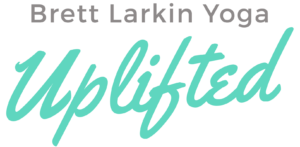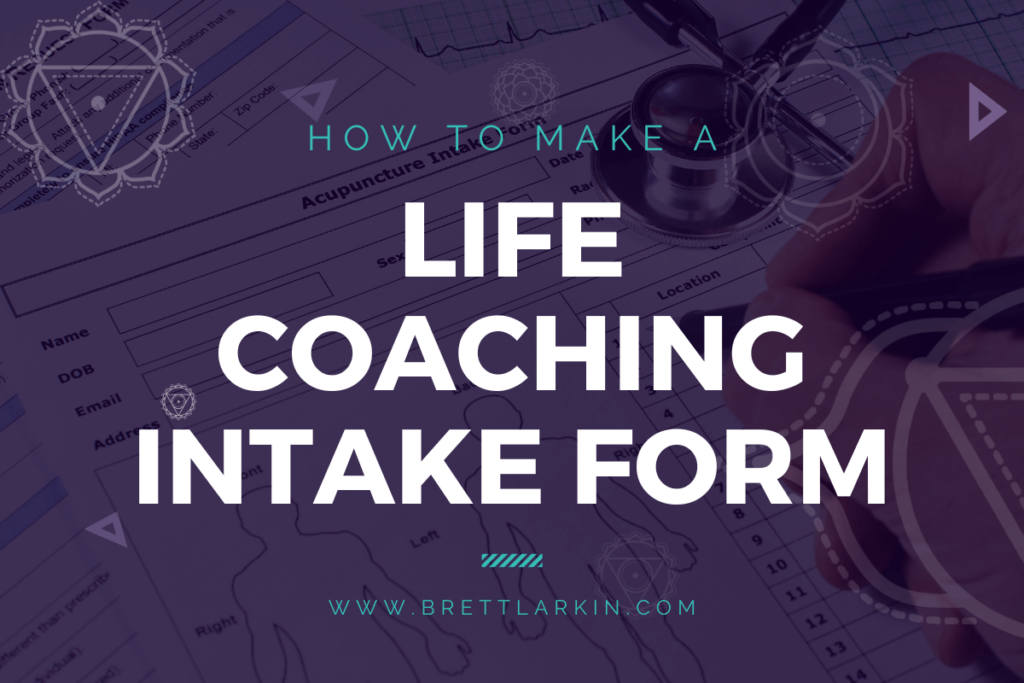A coaching intake form is a must have for life coaches. An intake form can help life coaches determine whether or not they have the capacity to help a potential client before they even engage in a discovery call. An intake form helps a life coach learn not only background information regarding their prospective clients, but also what their goals are.
Let’s take a closer look at a life coaching intake form & why your coaching business needs them, or should implement them. ✨
What Is A Life Coaching Intake Form?
A life coaching intake form is a quick at a glance way for life coaches to get all necessary information from a client or potential client. Intake forms include information a coach needs before working with a client in order to determine if they will be a good fit, if the life coach can help the client achieve the desired results, get the client’s personal information, etc.
You can utilize an intake form however it is best for your coaching business, but it is recommended that you keep the in depth questions to no more than 10. We will dice into what those questions should look like a little later.
Why Use An Intake Form?
As you build your business, you may opt to not use intake forms. However, if you are a new life coach or just starting out, it would be in your best interest to use one. You should use a life coaching intake form because if you are struggling with imposter syndrome, nervousness, lack of confidence, unsure of your niche, and/or all of the other feelings that come with being a newly certified coach to help you work out your coaching process.
Some benefits of a life coaching intake form are:
- reducing the need for a coaching intake session as a first session
- client’s background including whether or not they have worked with a life coach before & what their experience was like
- marital status, this helps a life coach to know about the support system of new clients
- client’s personal goals
- what the client’s biggest success has been thus far
- short term goals
- long term goals
- what type of progress they are looking to make (goals)
- explore what the client is looking for/ expectations out of their coach
- allow space to address specific questions or anything else specific to their goals in order for the coach to create a coaching program that best suit their individual client
- contact details
Overall, an intake form will allow you as the coach to collect valuable information about your new clients that will help you get to know them.
Try Brett’s yoga intake form to get started, adapting yours to include questions to guide your type of life coaching:
Download My Intake Form to Use with Your Own Yoga Privates - FREE!

When To Complete The Intake Form
There are a couple options for when you should have your clients complete their life coaching intake form that will vary from coach to coach & your own specific coaching business.
Option 1: When they book their discovery call. This is my personal preferred time to do the intake because I can then use the discovery call to explore their information, get clear on their goals, & we can both address any questions we have for each other. You can also come up with ideas on how you can tailor your coaching program to the individual client during this call as well in order to assure them you can help them get results in their life.
The easiest way to set this up is by using a scheduling service such as Calendly or another scheduler. I pay a little bit extra through my Squarespace website to have my scheduler directly serviced through my website provider, making it easy to have everything regarding my business in one place. That being said, there are options for how to allow your clients to schedule calls with you. You can give them the “Discovery Call” option in a drop down & then add questions for them to answer in order to actually book the call.
Option 2: Send the intake form via Google Forms, Typeform, etc. after a client has initially signed up with you. Maybe you opt to chat with your potential clients via social media, or you genuinely use your Discovery Call to get to know your new client in real time & collect information during the call. The client decides to sign up to work with you, and then you send over the life coach intake form along with the contract for them to sign. The beauty of this method is that you can let your client know to expect the intake form during the kickoff calls/ discovery calls.
Regardless of the timing of your life coach intake form, you definitely want it completed before the first coaching session in order to make the coaching journey more effective & make transformation available immediately.
How To Structure Your Intake Form
Your intake form is the first step to the onboarding process, so how you structure the client intake form is extremely important. You want to gather information about your client in a concise, but in-depth way to save time in that first call.
Client goals
Asking your client what their goals are gives you a better understanding of what they are looking for from a coach. This piece of information is one of the most valuable resources within the life coach intake form.
You want this information, as a coach, so you can create a plan that works for each client on a personal level. Coaching is not one size fits all. You also want this information because you will be able to quickly & easily determine if you are actually capable of helping the client.
Some sample questions for how to get all the necessary information regarding client goals:
- What would you like to see as a result of our time together?
- What are your expectations of me as a coach?
- What are your goals?
- What are your biggest challenges when it comes to reaching your goals?
- Why did you choose to reach out to me?
Personal history
Having a client’s personal history is so helpful because it allows you to know the mindset of where your client is coming from, what kind of help they have received in the past, what they thought about the help they have received, what kind of learning curve you may need, and give you some background on both them as a person & their mental health.
Collecting personal history from your clients should include information about their past experiences with reaching their goals, their thoughts about themselves, who their biggest influences in life are, and what some of their limiting beliefs are.
Here are some some sample questions o get your brain thinking and/ or get you started:
- What are the top 3-5 beliefs that you feel are keeping you stuck & where do those thoughts come from?
- Why do you feel you have not yet achieved your desires?
- If you could change one thing in your life that you feel is the biggest thing keeping you stuck, what would it be & why?
- Name 2 things that you feel you have been successful at & why you believe they were successful for you?
- How would you describe your purpose and contribution in life?
Coaching preferences
When you are asking your clients to fill out the coaching preferences segment of your life coach intake form, you are really asking them how you can best support them. Obviously, as their life coach, you want to help them & see them succeed. However, breaking down the concept of “how can I support you” will help you better create sessions & make the desired progress with your client.
Simply asking “how can I support you” is way too broad & will inevitably lead to very generic answers. Ever the savvy life coach, you know you need to be more specific about what kind of help your clients need as help pertains to each one as an individual.
Some examples of questions to ask here include:
- After setting goals for yourself, how do you keep yourself motivated? What makes you slow down/ burn out?
- How do you handle criticism whether constructive or otherwise?
- On a scale of 1-10 with 1 being the lowest & 10 being the highest, how hard do you want me to push you in order to reach your goals?
- How do you respond when you are asked hard questions i.e. questions that make you have to confront yourself & your beliefs?
- When you think of your ideal coach, what does support from your coach look like? Describe what support from your ideal coach looks like.
Why You Need To Ask Life Coaching Questions
You need to ask all of these various forms of questions to be prepared for your sessions with your clients. Experienced coaches know that for their clients to see success in working with them, you must practice creating an ideal session for your clients. In order to create that type of session, you need to be as prepared as possible.
Between asking in- depth questions on an intake form & having a kickoff call to get to know them, you will be able to address all facets of their goals, what is holding them back, & how you can help them clear the blocks & guide them to achievement.
For example, say you are coaching a client who does not have a very healthy relationship with her mother. Her mother judges her every move & inserts her opinion about every little thing whether solicited or not. Your client then comes to a session after having just gotten off the phone with her mother who has voiced her “concerns” about the progress you made with your client last week. You are ready to handle this because you had her fill out the intake forms. You expected & anticipated her mother to have an impact on her success at some point. So, you are able to guide her through a practice that allows her to access the positive psychology of your last session in order to bring her back to the present. Back to her own wins & move her away from the influence of her mothers thoughts. Had you not had this information from your kickoff call or the intake forms, you would have been scrambling to come up with a solution.
I encourage both you and your coaching practice to begin to integrate the mind & body connection as well. You are helping your clients reprogram mentally, so help their bodies embody these accomplishments as well. With Brett’s SUKHA: Month of Flexibility & Ease Training Plan, you will be able to help yourself & your clients learn to slow down & be more flexible with themselves & the outside world from the inside outward.
Intake Questions To Include On A Coaching Intake Form
Below you will find example questions based on what type of coach you are in order to get you started with your own coaching intake form.
Life coaching intake form questions
Life Coach questions aim to help the coach get information regarding where a client comes from, where they are currently, & where they are looking to go by the time they are done working with you. These questions are very holistic in the sense that you want to really understand the mental state & mindset of your clients so that you can create a unique client experience with great feedback at the end of your time together.
Examples of life coaching questions:
- Have you ever worked with a life coach before? If so, how was your experience?
- List your top 3-5 goals you have for yourself within the next 6 months. Within the next 3 years. Why are these your goals?
- Do you have a support system that wants to see you meet the goals you listed above?
- Are you easily influenced by others thoughts, feelings, beliefs, emotions?
- What is one thing you would like me to know about you that you keep hidden from those within your inner circle? Why do you keep this detail hidden from them?
- Are you typically someone that sets goals & always reaches them? If not, why do you think you struggle with meeting goals?
- What is the most challenging obstacle you have had to overcome? Why was it challenging & how did you overcome it?
- What is your definition of success & how will you know when you are successful?
- Why do you think you have not been able to create lasting change in your life thus far?
- If you could have anything your heart desired & you knew you could not fail, what would you have & why?
Health coaching intake form questions
As a health coach, your prime reason for needing a life coach intake form within your onboarding process is to help more clients become more healthy. Be mindful, that like life coaching, each client’s definition of healthy will look different. So, it is imperative that your life coach intake form not only get to know the client’s health history, current status, & what their goals are; you also need to determine what “healthy” looks like to that particular client. This way, you can cultivate a client experience that is specific to the person & their mindset on health.
Questions to ask to get you started are:
- If you could envision yourself at your healthiest moment, what does that look like?
- When you hear the word “healthy”, what thoughts, feelings, and emotions come up for you? Why?
- What is your past experience when it comes to getting healthy?
- Why have you decided that NOW is the time to get help in your journey to better health?
- Do you have any health issues, both physical & mental, that I should know about?
- On a scale of 1-10, how stressed are you on a daily basis?
- On a scale of 1- 10, how well do you sleep? When you are sleeping, how many hours do you sleep continually?
- Describe the eating habits of your childhood household. (EX: did you have to clean your plate, did you eat fast food every night, did you skip meals, etc.).
- Describe your eating habits now.
- Why are your health goals important to you?
Thinking of broadening your own perspective as a health professional, or have you even thought that it might be nice to have “yoga instructor” added to your list of credentials? Brett & Uplifted Yoga offer a wonderful 200 Yoga Teacher Training Course. This is the course I personally took & have not regretted it a day since. As any type of coach, being able to connect the mind & body is a credential that is well worth it. 😍
Career coaching intake form questions
Career coaches…the purpose of your intake forms is to discover what career goals your clients have. The unique thing about career coaching is that some of you are helping people find happiness again in their current job, some of you are helping people get in the mindset to move up in their current job, & some of you are helping people into a new career overall. Regardless of what type of career coaching you are doing, your intake forms are to learn what your clients are looking to accomplish within their careers when they are finished working with you.
Questions to include:
- What is your current position in your career? Please include your overall job, your official job title, & what your responsibilities are within your job.
- Where do you want to go in your career? In other words, if you could re-answer the question above with your dream job, job title, & job description… What would that look like?
- What personal career goals have you met within the last 3 years?
- What personal career goals do you have set for the next 3 years?
- What projects have you completed within your career that you are most proud of? Why are you proud of them?
- What are your biggest struggles when it comes to your career?
- If you could wake up tomorrow, and have your dream day at your job, describe what that day looks like.
- How do you currently spend your free time?
- On a scale of 1-10, how would you rate your work/ life balance? Why would you rate it that way?
- What do you enjoy most about your job?
Relationship coaching intake form questions
Like career coaches, there is a variety of types of relationship coaching. However, your intake forms are still accomplishing the same thing… to discover your client’s weaknesses & strengths when it comes to relationships as well as what kind of changes they want to make to have better relationships and/ or what they want their future relationships to look like. Please note: this is the concept whether you are coaching clients on romantic relationships, work relationships, general relationships, and… well… you get the idea.
Some questions you may ask:
- What do you currently look for when establishing a relationship with another person?
- What characteristics typically turn you off immediately. Why?
- What characteristics immediately turn you on & make you more intrigued?
- How satisfied are you with your current relationship? Why?
- What excites you about your relationships?
- Do you enjoy meeting new people? Describe your reaction to being in a setting where you are going to meet new people. Be sure to include all of the thoughts & emotions that come up for you.
- When faced with a conflict in your relationships, is it easy for you to confront the other person? Explain why or why not.
- Who are your top 3 relationships with? What do you treasure about these relationships & what would you like (if anything) to be different in these relationships?
- What are the most difficult topics to discuss in your relationships & why are they difficult for you to discuss?
- Imagine your dream relationship… What does it look like? Please include what characteristics you enjoy about this relationship, how you are treated, & the balance within the relationship.
Mindset coaching intake form questions
A life coach intake form for mindset coaches should address what your clients want to believe about their perceived reality. You need to know where they stand in life right now & where they want to go so that you can help them achieve the goals they are seeking. Your forms or even your first session could be used to access their current mindset.
Some examples of questions you may want to include on your forms are:
- What do you believe is truly possible for you?
- What do you believe is holding you back?
- What are your top 3-5 values in life?
- On a scale of 1-10, how committed are you to shifting your mindset in order to achieve your goals?
- What are your current beliefs about yourself?
- On a scale of 1-10, how much do others influence your decision making processes & day to day tasks?
- What are your top 3 successes thus far & why do you claim them as being successful?
- Describe your ideal day from the time you wake up to the time you go to sleep.
- How will you know when you have achieved your goals?
- What would you do & who would you be if you knew you could not fail?
What To Do With Information Gathered
Once you have all the information you need from your life coach intake form, you should ensure you ask any follow up questions you may have regarding your new life coaching client. You need to make sure you keep up with your forms as well for liability purposes. You should review your client’s information before each session if not more often than that even. The whole purpose of these documents is for you to get to know your clients, help them reach individual goals, & construct a custom program for each person in order for them to achieve their desired results.
⭐️ Pro Tip: Do not simply send out an intake form for the formality of doing so. This will hurt both you & your coaching practice. Your coaching business is not one size fits all. While you may have a set structure for each session, you should still be taking the time to customize your sessions.
Closing Thoughts
Some final thoughts before I leave you… if you want some more ideas on how to grow your coaching business & become more effective at coaching, I invite you to indulge in the How To Get Clients For Life Coaching post. Growing your business can often prove to be difficult, especially if you do not already have a following. So, why not make it a little bit easier & get some insider tips on how to see advancement in your business a little bit faster?

About the Author | Ashlie Franey
Ashlie Franey is a Woman Rising. She is a Higher Self & Identity Coach helping women to bridge the gap from their current selves to their future selves. Using her RISE method, her clients learn to step into their power & begin to fully embody the woman they want to be.
Next Steps
- If you’re interested in practical kriya yoga as a way to improve your daily life and relationships, check out my Yoga for Self Mastery course.
- Order my Yoga Life book for a practical guide to creating balance in your life through yoga.
- Check out my YouTube channel and find some yoga classes that you can try out for yourself!
YOU MIGHT ALSO LIKE
- Navigating Loss: How Grief Coaching Can Help
- What Is Spiritual Coaching? How To Become A Spiritual Coach
- What Is Mindset Coaching? A Complete Breakdown
- How To Make A Life Coaching Intake Form
- 7 Steps To Start A Life Coaching Business
- What Is A Self Love Coach? And How To Become One
- Self-Coaching: How To Become Your Own Life Coach
- Types Of Life Coaches: How To Choose Your Life Coaching Niche
- How To Make A Life Coach Business Plan (With Template)
- Life Coach Marketing: A Comprehensive Guide For Long-Term Growth
- How To Get Clients For Life Coaching
- Are Life Coaches Worth It? Take This Self-Assessment To Find Out.
- How Much Does A Life Coach Make? Around $5k+ A Month
- Life Coaching Skills: Are You Meant To Be A Life Coach?
- How To Become A Life Coach (For Yoga Teachers)
- What is a Life Coach? 21 Ways a Life Coach Can Help You











